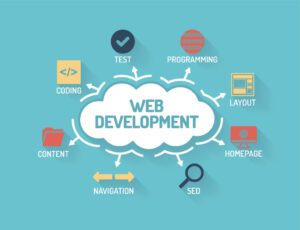The relentless march of artificial intelligence (AI) has sparked debates and speculation about its potential to replace human programmers. As AI continues to advance at an unprecedented pace, questions arise: Will AI entirely take over the role of programmers? Will coding jobs become obsolete? In this blog, we embark on a journey through the realms of AI and programming, exploring the possible benefits, drawbacks, and implications of AI potentially replacing programmers. Let’s unravel the mysteries together and discern whether coders will be supplanted by AI.
AI’s Ascendance in Programming
The symbiotic relationship between AI and programming is increasingly evident in the digital age. AI’s impact on every stage of the software development life cycle is profound. From its initial role as a coding assistant, AI has evolved into a sophisticated tool capable of generating innovative solutions for diverse programming challenges.

One of the most noticeable influences of AI on programming is in enhancing the efficiency and quality of code. AI-powered code completion and recommendation systems have made coding more effective. These systems analyze the context in which code is written, providing sensible suggestions and helping programmers produce better, more reliable code.
AI has not only transformed how software is developed but has also democratized the field. Low-code and no-code platforms leverage AI to abstract technological complexities, enabling non-programmers to create functional software. This shift broadens the audience for software development, fostering creativity among domain experts.
Why Software Engineers Remain Essential?
Despite the automation and AI revolutionizing the software development industry, software engineers play indispensable roles. Here are key reasons why software engineers are irreplaceable:
1. Complex Problem Solving:
Software engineers excel at solving intricate problems that demand critical and innovative thinking, generating original ideas tailored to specific project requirements.
2. Architectural Expertise:
Engineers contribute to designing a software system’s architecture, making critical decisions affecting scalability, performance, and security.
3. Quality Assurance:
Ensuring software accuracy and reliability is a pivotal responsibility of software engineers. They write unit tests, debug, and validate code to prevent and minimize errors.
4. Customization and Adaptation:
Software engineers tailor solutions to meet specific business needs, adjusting software to align with particular requirements and organizational objectives.
5. Innovation and Research:
Engineers drive innovation by constantly exploring new technologies, adopting cutting-edge techniques, and conducting research.
6. Security and Compliance:
In the face of cybersecurity threats and regulatory requirements, software engineers are essential for developing and maintaining secure and compliant software.
7. Human-Centric Design:
Considering graphical user interfaces and user experiences, engineers ensure the software is user-friendly, intuitive, and aligned with human behavior.
8. Project Management:
Engineers often take on project management responsibilities, supervising development cycles, organizing teams, and ensuring projects meet deadlines and budgets.
9. Code Optimization:
Proficient in enhancing code for efficiency, performance, and resource efficiency, engineers are essential for well-functioning programs that use resources judiciously.
10. Maintenance and Updates:
Engineers are responsible for maintaining software, implementing upgrades, and resolving issues throughout the software’s lifecycle, ensuring reliability and long-term viability.
AI Tools: A Programmer’s Ally
AI tools serve as invaluable allies to programmers, enhancing productivity by automating routine coding activities, improving code quality, and providing real-time feedback. Here’s how AI tools assist programmers:
1. Code Autocompletion: AI-enhanced code editors suggest knowledgeable code as developers type, saving time and minimizing syntax errors.
2. Debugging and Code Analysis: AI technologies identify coding flaws, bugs, and security risks, streamlining the debugging process.
3. Code Generation: AI systems generate boilerplate code for repetitive operations, sparing programmers from starting from scratch.
4. Predictive Typing: AI with predictive typing anticipates the next code element based on the current context, simplifying the typing of complex code structures.
5. Code Refactoring: AI suggests refactoring solutions to enhance code readability and maintainability.
6. Automated Testing: Test cases can be automatically generated and run using AI-powered test generators to check code functionality.
7. Natural Language Processing (NLP): AI facilitates natural language queries, making code navigation and searching more intuitive.
8. Algorithm Design: AI can recommend algorithms for specific tasks, easing the algorithm creation process.
9. Optimization and Customization: AI optimizes code for efficiency, offering suggestions for better resource consumption and performance.
10. Documentation Generation: AI automates code documentation, making it easier for developers to share and maintain their code.
Limitations of AI in Programming
While AI tools significantly augment the capabilities of programmers, there are limitations to their standalone effectiveness. Some constraints include:
1. Lack of Creativity: AI may struggle with creative problem-solving and thinking compared to human programmers, especially when facing novel, non-standard problems.
2. Understanding Context: AI might find it challenging to comprehend the broader context of a project, making it difficult to generate code aligned with specific project needs and objectives.
3. Insufficient Domain Information: AI tools may lack domain-specific information, hindering their ability to generate code for specialized professions or industries.
4. Debugging Complex Issues: Identifying and resolving large, multifaceted problems requiring in-depth subject expertise and creative problem-solving can be challenging for AI.
5. Data Dependence: AI technologies often rely on extensive datasets for training, limiting their performance when dealing with tasks outside their training data.
6. Ethical Concerns: AI-generated programming may inadvertently introduce biases or ethical issues, making it challenging to ensure ethical coding practices and prevent biased results.
7. Oversimplification: AI tools may oversimplify problems, neglecting intricate details of real-world programming and potentially leading to suboptimal solutions.
Future Scope of AI and Programming
The future of AI and programming holds promise for solving complex issues, enhancing developer productivity, and driving innovation across various domains. Human programmers will continue to be the backbone of software development, collaborating with AI to create more effective, ethical, and meaningful software solutions. Anticipated developments in the future include:
1. Low-Code/No-Code Revolution: The rise of low-code and no-code platforms will empower even non-programmers to design powerful applications, fostering new opportunities for innovation.
2. AI-Powered Debugging: Debugging tools enhanced by AI will evolve, providing real-time feedback and proactive error prevention.
3. AI-Generated Code: AI will play a more significant role in generating code snippets, accelerating development, and ensuring code quality. However, it is unlikely to completely replace human coders, instead assisting them in code creation.
4. Enhanced Productivity: AI will continue to improve software development efficiency through the automation of repetitive tasks, code generation, and code analysis, greatly enhancing developer productivity.
5. Natural Language Programming: AI will enable natural language programming, allowing developers to interact with code using simple questions and making programming more accessible.
6. Intelligent Code Analysis: AI tools will enable deeper code analysis, helping identify potential performance bottlenecks and architectural issues, thereby increasing software reliability and quality.
7. Ethical Programming: AI will assist in identifying ethical issues in code, ensuring software complies with ethical and legal norms.
8. Customized Development Environments: AI will customize development environments by adapting tools and workflows to individual developer preferences and requirements.
9. Cross-Domain Expertise: AI will enhance its cross-domain capabilities, allowing developers to leverage industry-specific expertise and provide solutions for niche markets.
Wrapping Up
AI is a powerful tool in the programming landscape, but it is not poised to replace programmers. Instead, it functions as a valuable partner, aiding in repetitive tasks, suggesting improvements, and expediting coding processes. While AI lacks the creativity and problem-solving skills of humans, the future is envisioned as a collaborative space where programmers work alongside AI to build smarter and more efficient software. AI is a friend, not a replacement, in the coding realm, serving as a helpful assistant while the creative magic originates from human programmers.




